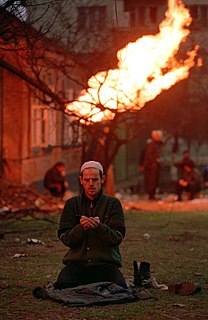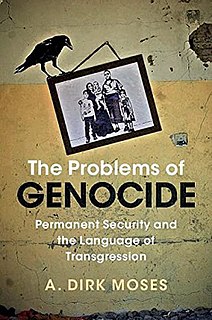
Genocide is the intentional destruction of a people—usually defined as an ethnic, national, racial, or religious group—in whole or in part. Raphael Lemkin coined the term in 1944, combining the Greek word γένος with the Latin suffix -caedo.

An ethnic conflict is a conflict between two or more contending ethnic groups. While the source of the conflict may be political, social, economic or religious, the individuals in conflict must expressly fight for their ethnic group's position within society. This criterion differentiates ethnic conflict from other forms of struggle.
Mass killing is a concept which has been proposed by genocide scholars who wish to define incidents of non-combat killing which are perpetrated by a government or a state. A mass killing is commonly defined as the killing of group members without the intention to eliminate the whole group, or otherwise the killing of large numbers of people without a clear group membership.

Cultivation theory is a sociological and communications framework to examine the lasting effects of media, primarily television. It suggests that people who are regularly exposed to media for long periods of time are more likely to perceive the world's social realities as they are presented by the media they consume, which in turn affects their attitudes and behaviors.

Political repression is the act of a state entity controlling a citizenry by force for political reasons, particularly for the purpose of restricting or preventing the citizenry's ability to take part in the political life of a society, thereby reducing their standing among their fellow citizens. It is often manifested through policies such as human rights violations, surveillance abuse, police brutality, imprisonment, involuntary settlement, stripping of citizen's rights, lustration and violent action or terror such as the murder, summary executions, torture, forced disappearance and other extrajudicial punishment of political activists, dissidents, or general population. Political repression can also be reinforced by means outside of written policy, such as by public and private media ownership and by self-censorship within the public.

Religious violence covers phenomena in which religion is either the subject or the object of violent behavior. All the religions of the world contain narratives, symbols, and metaphors of violence and war. Religious violence is violence that is motivated by, or in reaction to, religious precepts, texts, or the doctrines of a target or an attacker. It includes violence against religious institutions, people, objects, or events. Religious violence does not exclusively include acts which are committed by religious groups, instead, it includes acts which are committed against religious groups.

Armenian genocide denial is the claim that the Ottoman Empire and its ruling party, the Committee of Union and Progress (CUP), did not commit genocide against its Armenian citizens during World War I—a crime documented in a large body of evidence and affirmed by the vast majority of scholars. The perpetrators denied the genocide as they carried it out, claiming Armenians were resettled for military reasons, not exterminated. In the genocide's aftermath, incriminating documents were systematically destroyed, and denial has been the policy of every government of the Republic of Turkey, as of 2022.
Hans Christian Gerlach is professor of Modern History at the University of Bern. Gerlach is also Associate Editor of the Journal of Genocide Research and author of multiple books dealing with the Hunger Plan, the Holocaust, and genocide.

Mass killings under communist regimes occurred through a variety of means during the 20th century, including executions, famine, deaths through forced labour, deportation, and imprisonment. Some of these events have been classified as genocides or crimes against humanity. Other terms have been used to describe these events, including classicide, democide, red holocaust, and politicide. The mass killings have been studied by authors and academics and several of them have postulated the potential causes of these killings along with the factors which were associated with them. Some authors have tabulated a total death toll, consisting of all of the excess deaths which cumulatively occurred under the rule of Communist states, but these death toll estimates have been criticized. Most frequently, the states and events which are studied and included in death toll estimates are the Soviet Union, the Holodomor, and the Great Purge; the People's Republic of China and the Great Chinese Famine and the Cultural Revolution; and Democratic Kampuchea and the Cambodian genocide. Sometimes, other states and events have also been included.
The Bihari Muslim minority in Bangladesh were subject to persecution during and after the 1971 Bangladesh Liberation War, experiencing widespread discrimination. Biharis were ethnic Urdu-speakers and largely maintained a pro-Pakistani stance, supported the Pakistan Armed Forces and opposed the independence of Bangladesh and the Bengali language movement. Biharis faced reprisals from Mukti Bahini and militias and from 50,000 to 55,000 were killed. Bihari representatives claim a figure of 600,000 Biharis killed.

Genocidal rape, a form of wartime sexual violence, is the action of a group which has carried out acts of mass rape and gang rapes, against its enemy during wartime as part of a genocidal campaign. During the Armenian Genocide, the second Sino-Japanese war, the Holocaust, the Bangladesh Liberation War, the Bosnian War, the Rwandan genocide, the Congolese conflicts, the Iraqi Civil War, the South Sudanese Civil War, the Rohingya genocide, the mass rapes that had been an integral part of those conflicts brought the concept of genocidal rape to international prominence. Although war rape has been a recurrent feature in conflicts throughout human history, it has usually been looked upon as a by-product of conflict and not an integral part of military policy.

Anthony Dirk Moses is an Australian scholar who researches various aspects of genocide. In 2022 he became the Anne and Bernard Spitzer Professor of Political Science at the City College of New York, after having been the Frank Porter Graham Distinguished Professor of Global Human Rights History at the University of North Carolina at Chapel Hill. He is a widely regarded as a leading scholar on genocide, especially in colonial contexts, as well as on the political development of the concept itself. He is known for coining the term racial century in reference to the period 1850–1950. He is editor-in-chief of the Journal of Genocide Research.

Prevention of genocide is any action that works toward averting future genocides. Genocides take a lot of planning, resources, and involved parties to carry out, they do not just happen instantaneously. Scholars in the field of genocide studies have identified a set of widely agreed upon risk factors that make a country or social group more at risk of carrying out a genocide, which include a wide range of political and cultural factors that create a context in which genocide is more likely, such as political upheaval or regime change, as well as psychological phenomena that can be manipulated and taken advantage of in large groups of people, like conformity and cognitive dissonance. Genocide prevention depends heavily on the knowledge and surveillance of these risk factors, as well as the identification of early warning signs of genocide beginning to occur.
Genocide studies is an academic field of study that researches genocide. Genocide became a field of study in the mid-1940s, with the work of Raphael Lemkin, who coined genocide and started genocide research, and its primary subjects were the Armenian genocide and the Holocaust; the Holocaust was the primary subject matter of genocide studies, starting off as a side field of Holocaust studies, and the field received an extra impetus in the 1990s, when the Rwandan genocide occurred. It received further attraction in the 2010s through the formation of a gender field.
Online youth radicalization is the action in which a young individual or a group of people come to adopt increasingly extreme political, social, or religious ideals and aspirations that reject or undermine the status quo or undermine contemporary ideas and expressions of the nation. As for radicalization, online youth radicalization can be both violent or non-violent.
The late Ottoman genocides is a historiographical theory which sees the concurrent Armenian, Greek, and Assyrian genocides that occurred during the 1910s–1920s as parts of a single event rather than separate events which were initiated by the Young Turks. Although some sources, including The Thirty-Year Genocide by the historians Benny Morris and Dror Ze'evi, characterize this event as a genocide of Christians, others such as those written by the historians Dominik J. Schaller and Jürgen Zimmerer contend that such an approach "ignores the Young Turks' massive violence against non-Christians", in particular against Muslim Kurds.

The Thirty-Year Genocide: Turkey's Destruction of Its Christian Minorities, 1894–1924 is a 2019 history book written by Benny Morris and Dror Ze'evi. They argue that the Armenian genocide and other contemporaneous persecution of Christians in the Ottoman Empire constitute an extermination campaign, or genocide, carried out by the Ottoman Empire against its Christian subjects.

The psychology of genocide attempts to explain genocide by means of psychology. Psychology of genocide aims to explain the preconditions of genocide and why some people become genocide perpetrators while others are bystanders or rescuers.
Benjamin Andrew Valentino is a political scientist and professor at Dartmouth College. His 2004 book Final Solutions: Mass Killing and Genocide in the 20th Century, adapted from his PhD thesis and published by Cornell University Press, has been reviewed in several academic journals.

The Problems of Genocide: Permanent Security and the Language of Transgression is a 2021 book by Australian historian A. Dirk Moses. The book explores what Moses sees as flaws in the concept of genocide, which he argues allows killings of civilians that do not resemble the Holocaust to be ignored. Moses proposes "permanent security" as an alternative to the concept of genocide. The book was described as important, but his emphasis on security is considered only one factor to be causing mass violence.












